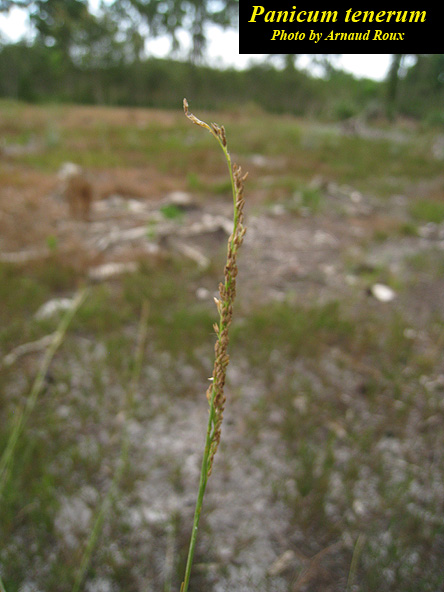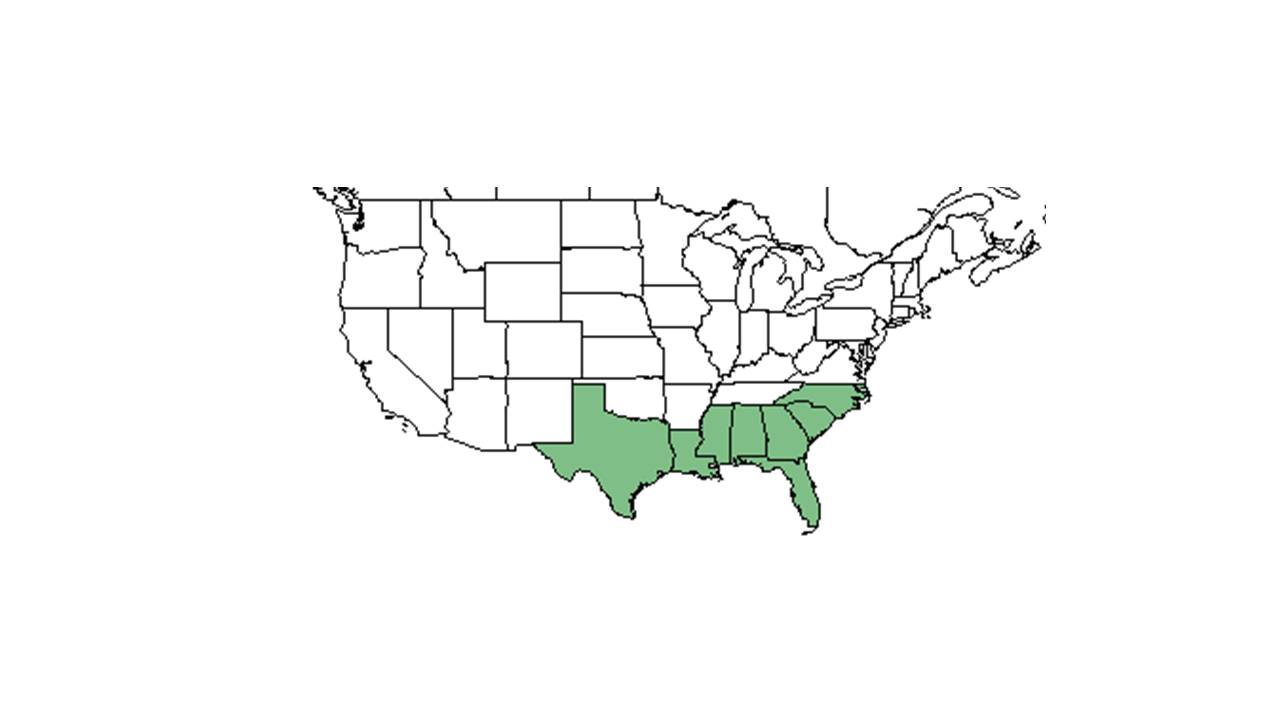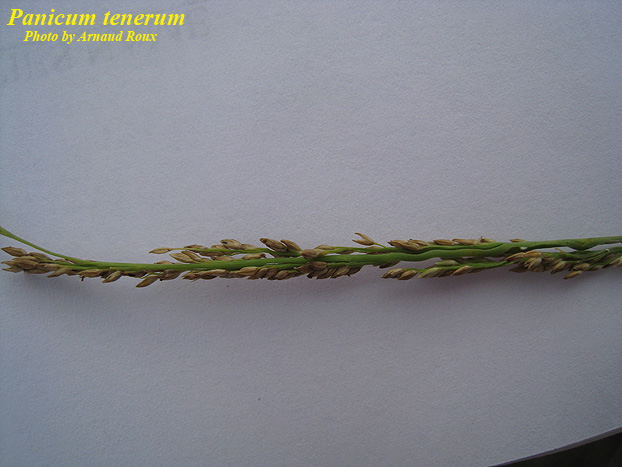Difference between revisions of "Coleataenia tenera"
Krobertson (talk | contribs) (→Description) |
(→Taxonomic notes) |
||
| (10 intermediate revisions by 8 users not shown) | |||
| Line 18: | Line 18: | ||
}} | }} | ||
| − | Common names: bluejoint panicgrass, | + | Common names: bluejoint panicgrass, southeastern panic grass |
==Taxonomic notes== | ==Taxonomic notes== | ||
| − | + | Synonyms: ''Sorengia tenera'' (Beyrich ex Trinius) Zuloaga & Morrone; ''Panicum tenerum'' Beyrich ex Trinius<ref name=weakley>Weakley, A.S. 2020. Flora of the Southeastern United States. Edition of 20 October 2020. University of North Carolina at Chapel Hill, Chapel Hill, North Carolina.</ref> | |
| + | |||
| + | Varieties: none<ref name=weakley/> | ||
==Description== | ==Description== | ||
| Line 30: | Line 32: | ||
==Ecology== | ==Ecology== | ||
===Habitat===<!--Natural communities, human disturbed habitats, topography, hydrology, soils, light, fire regime requirements for removal of competition, etc.--> | ===Habitat===<!--Natural communities, human disturbed habitats, topography, hydrology, soils, light, fire regime requirements for removal of competition, etc.--> | ||
| − | This species can be found in shallow depression ponds, pine flatwoods, wet prairies, bogs, swamps, marshes, and savannas. It has been observed in open areas growing in moist to drying sandy peat and loamy sands<ref name="fsu"/> | + | This species can be found in shallow depression ponds, pine flatwoods, wet prairies, bogs, swamps, marshes, and savannas. It has been observed in open areas growing in moist to drying sandy peat and loamy sands.<ref name="fsu"/> ''C. tenera'' is a dominant species that has been found in short-hydroperiod prairies occurring in Everglades National Park as well.<ref name="slocum">Slocum, M. G., W. J. Platt, et al. (2003). "Effects of differences in prescribed fire regimes on patchiness and intensity of fires in subtropical savannas of Everglades National Park, Florida." Restoration Ecology 11: 91-102</ref> This species has also been found growing in human disturbed habitats such as pine plantations, clear cut pine flatwoods, along roadsides, disturbed cypress lowlands, and cutover ponds.<ref name="fsu"/> |
===Phenology===<!--Timing off flowering, fruiting, seed dispersal, and environmental triggers. Cite PanFlora website if appropriate: http://www.gilnelson.com/PanFlora/ --> | ===Phenology===<!--Timing off flowering, fruiting, seed dispersal, and environmental triggers. Cite PanFlora website if appropriate: http://www.gilnelson.com/PanFlora/ --> | ||
| − | This species has been observed to flower and fruit from June through November<ref name="fsu"/> | + | This species has been observed to flower and fruit from June through November.<ref name="fsu"/> |
<!--===Seed dispersal===--> | <!--===Seed dispersal===--> | ||
<!--===Seed bank and germination===--> | <!--===Seed bank and germination===--> | ||
<!--===Fire ecology===--> <!--Fire tolerance, fire dependence, adaptive fire responses--> | <!--===Fire ecology===--> <!--Fire tolerance, fire dependence, adaptive fire responses--> | ||
<!--===Pollination===--> | <!--===Pollination===--> | ||
| − | <!--=== | + | <!--===Herbivory and toxicology===--> |
<!--===Diseases and parasites===--> | <!--===Diseases and parasites===--> | ||
| − | ==Conservation and | + | ==Conservation, cultivation, and restoration== |
| − | == | + | ==Cultural use== |
==Photo Gallery== | ==Photo Gallery== | ||
<gallery widths=180px> | <gallery widths=180px> | ||
Latest revision as of 19:21, 16 June 2023
| Coleataenia tenera | |
|---|---|

| |
| Panicum tenerum in photo above, a synonym of Coleataenia tenera Photo by Arnaud Roux, Atlas of Florida Vascular Plants | |
| Scientific classification | |
| Kingdom: | Plantae |
| Division: | Magnoliophyta - Flowering plants |
| Class: | Liliopsida – Monocotyledons |
| Order: | Cyperales |
| Family: | Poaceae ⁄ Gramineae |
| Genus: | Coleataenia |
| Species: | C. tenera |
| Binomial name | |
| Coleataenia tenera Bey. ex Trin. | |

| |
| Natural range of Coleataenia tenera from USDA NRCS Plants Database. | |
Common names: bluejoint panicgrass, southeastern panic grass
Contents
Taxonomic notes
Synonyms: Sorengia tenera (Beyrich ex Trinius) Zuloaga & Morrone; Panicum tenerum Beyrich ex Trinius[1]
Varieties: none[1]
Description
This species grows abundantly where it is found.[2]
Distribution
Ecology
Habitat
This species can be found in shallow depression ponds, pine flatwoods, wet prairies, bogs, swamps, marshes, and savannas. It has been observed in open areas growing in moist to drying sandy peat and loamy sands.[2] C. tenera is a dominant species that has been found in short-hydroperiod prairies occurring in Everglades National Park as well.[3] This species has also been found growing in human disturbed habitats such as pine plantations, clear cut pine flatwoods, along roadsides, disturbed cypress lowlands, and cutover ponds.[2]
Phenology
This species has been observed to flower and fruit from June through November.[2]
Conservation, cultivation, and restoration
Cultural use
Photo Gallery
Close up of Seeds on stem of Panicum tenerum synonym of Coleataenia tenera Photo by Arnaud Roux, Atlas of Florida Vascular Plants
References and notes
- ↑ 1.0 1.1 Weakley, A.S. 2020. Flora of the Southeastern United States. Edition of 20 October 2020. University of North Carolina at Chapel Hill, Chapel Hill, North Carolina.
- ↑ 2.0 2.1 2.2 2.3 Florida State University Robert K. Godfrey Herbarium database. URL: http://herbarium.bio.fsu.edu. Last accessed: June 2014. Collectors: Loran C. Anderson, R.K. Godfrey, R. Kral, H. Kurz, Cecil R Slaughter, Sidney McDaniel, George R. Cooley, R. J. Eaton, Olga Lakela, Allen G. Shuey, Steve L. Orzell, Edwin L. Bridges, R. A. Norris, and A. F. Clewell. States and Counties: Florida: Bay, Brevard, Calhoun, Charlotte, Collier, Franklin, Gulf, Indian River, Manatee, Martin, Okaloosa, Osceola, Palm Beach, Polk, and Wakulla. Countries: Honduras.
- ↑ Slocum, M. G., W. J. Platt, et al. (2003). "Effects of differences in prescribed fire regimes on patchiness and intensity of fires in subtropical savannas of Everglades National Park, Florida." Restoration Ecology 11: 91-102
